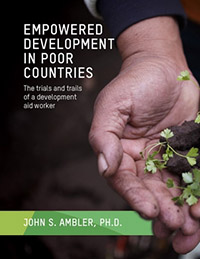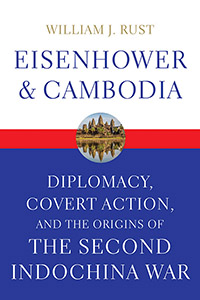NEWSLETTER
|
On the Bookshelf: Lessons for Development
The seminars drew on a lifetime of academic research and work in development, including 10 years with the Ford Foundation in South and Southeast Asia.
He began work with Ford in 1988 as a program officer in the Indonesia office. Two years later he was named deputy representative for India, Nepal and Sri Lanka and then was representative for Vietnam and Thailand before leaving the Foundation in 1997.
He followed his work at Ford with a year’s stint with the Social Science Research Council as its project manager for China and Vietnam, became regional director in Asia for CARE, and then joined Oxfam, first as senior vice president for programs and then as vice president for strategy.
“John is possessed of the ‘gift of doubt’,” said Raymond Offenheiser, president of Oxfam, in the foreword to the book, “and has used this gift throughout his career to question the fundamental assumptions of development. Yet, he has never been driven by doubt or cynicism to reject development efforts. Rather, he has embraced with humility and respect all those who toil in hope for a better world.”
Ambler notes in the preface to the book that “many development professionals never seem to learn from experience as they bounce from project to project, rarely ever seeing how what they left behind actually operates. Given the huge scale of aid grants and loans for developing countries, it is amazing how little accountability there is in terms of integrity of approach and quality....
“I don’t have all the answers, but I think these seminars provide some clarity about which approaches work and why.”
The book, he said, advances “what may be a more or less common set of programming principles for rural development. I start from the point of view that pro-poor, sustained, and empowering approaches to development are challenging and complicated. Equitable and just development really is rocket science....”
The book is available online on the Oxfam website.
HISTORY’S LESSONS FOR SOUTHEAST ASIA
The book was chosen by Choice magazine for its list of outstanding titles of scholarly works published in 2016.
“He conclusively demonstrates,” the citation reads, “that, as with Laos in 1958 and 1960, covert intervention in the internal political affairs of neutral Cambodia proved to be counterproductive for advancing the United States’ anti-Communist goals.... Rust skillfully traces the impact of ‘plausible deniability’ on the formulation and execution of foreign policy.
“His meticulous study not only reveals a neglected chapter in Cold War history, but it also illuminates the intellectual and political origins of U.S. strategy in Vietnam and the often-hidden influence of intelligence operations in foreign affairs.”
In an article for the LSE Review of Books, published by the London School of Economics, Elizabeth Becker, a former reporter for The New York Times, notes that “By scouring thousands of previously classified documents and new primary source materials, Rust shows how Washington refused to accept Cambodia’s stance as a neutral country and used covert actions and its massive financial and military might to push Cambodia into the U.S. camp, conspiring with Cambodia’s neighbors and dissidents.... Rust’s book eliminates any idea of American innocence.”
Rust discussed the background to the historical period, and the research he did to illuminate that time, in a lengthy interview with the Voice of America. Background on his other books on the region was provided in an article in the Winter 2016 issue of this newsletter in the LAFFing Parade section.
Rust, who worked at the Foundation from 1985 to 1991 in what was then the Office of Reports and now is the Office of Communications, continues to research and write about the region and that period in its history.
His latest project is a history of United States diplomacy and intelligence operations in Indonesia from 1942 through 1960. “The book starts,” he said, “with the evacuation of the U.S. consulate in Batavia/Jakarta when the Japanese invaded Java and will end with the aftermath of the failed U.S.-backed coup against President Sukarno in 1958.”
And, with all his books, he said, “one theme that emerges about U.S. relations with the newly independent countries of postwar Southeast Asia should have particular relevance today: During the decades that some look back to as a time when America was ‘great’, the regional ignorance and ideological rigidity of senior U.S. officials led to the unnecessary deaths of tens of thousands of Americans and millions of Southeast Asians.”
A STORY OF LONGING AND BELONGING
The book “invokes the Calcutta of the past,” wrote a reviewer in The Telegraph of Calcutta, “when it was a city of grace and charm, now lost, in great detail and a dash of nostalgia. Jael Silliman is a writer to make Calcutta and those who love the city proud.”
The writer Naveen Kishore said the novel is “Poignant. Full of Empathy. And humour. And love and longing. Quiet story-telling that gets under your skin.”
Silliman has written both scholarly works and an earlier novel, The Man With Many Hats, about the waning Jewish community of Calcutta, where she was born and raised. The new book chronicles the efforts of three people who return to the city of their birth “on a voyage of self-discovery” and in an effort to “unravel their pasts”.
The book, says Silliman, is “at once a story of longing, belonging and the making of family. It also is a tribute to Calcutta—home to many diverse communities.”
Silliman was a program officer for the Foundation in its Human Rights Unit from 2002 to 2009, concentrating on reproductive rights. Since she left Ford she has worked as a consultant for many NGOs on issues of gender and social justice and has written extensively on social movements that deal with issues of gender, race and environment.
|




